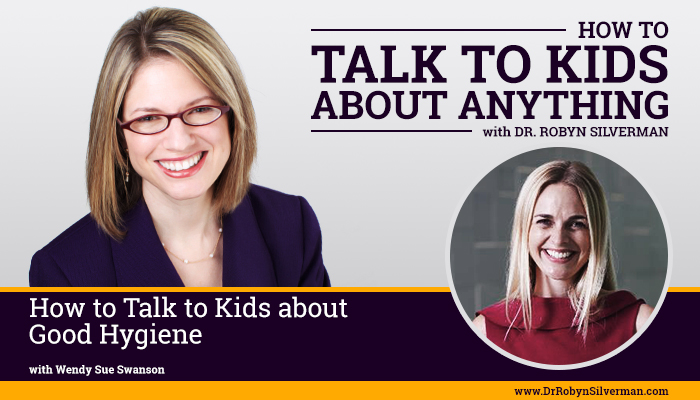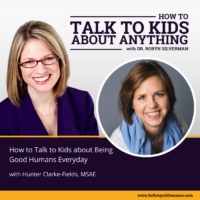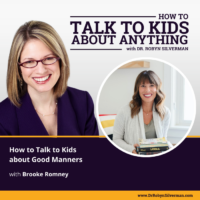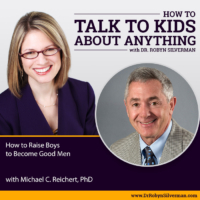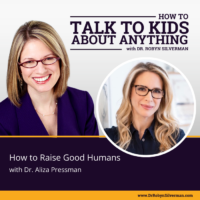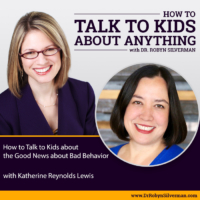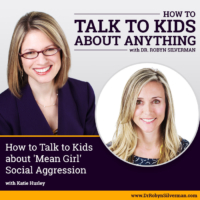Podcast: Play in new window | Download
Subscribe: Apple Podcasts | RSS | More
How to Talk to Kids about Good Hygiene
This podcast focuses on how we can help children use good hygiene and how we can live with bacteria in “smart ways,” take care of kids during flu season and teach children about good oral health. Wendy Sue Swanson, Chief of Digital Innovation at Seattle Children’s Hospital, talks about (1) oral hygiene, (2) head lice, (3) hand washing and (4) bathing. She leaves us with her top tips and her best take-aways so that kids (and adults) can stay healthy.
Good hygiene. Whether it’s bathroom hygiene, hand and nail hygiene, foot hygiene, oral hygiene, bathing hygiene or hair hygiene- it all helps to keep us clean and healthy. When our children are babies and toddlers, we take care of it all- from clipping their nails to bathing their bodies to toiletry and clean clothes. But as our children get older, we start to step back and allow our children to take charge. I’m not saying it always goes smoothly- sometimes kids fight their parents on taking a shower, others let their toenails grow until they make holes in their socks and we all know of the kids who just take any old clothes off of their floor and wear them once again if the sniff test reads, “well, not THAT bad.” And is it such a big deal? Sometimes it really is. So, we’ve got to talk to our kids about hygiene so they understand why keeping clean is so important to our health and how we feel.
Dr. Wendy Sue Swanson is welcomed back to the show– who you will remember from our show on how to talk to kids about food allergies. Bridging the digital divide between doctors and patients, Dr. Swanson, Chief of Digital Innovation at Seattle Children’s Hospital has blazed a trail of patient education using her voice through a variety of different channels in traditional and social media. Through her blog, podcast , social media channels and her parenting book she translates science and parenting information to the public. Swanson also regularly partners with reporters in traditional print, online, and television media and makes weekly TV appearances in Seattle with NBC affiliate, KING5 News. She hopes to transform the paternalistic approach to messaging into an empowered, patient-centered one where peers learn from each other and from expert advice online. Check her out at http://seattlemamadoc.seattlechildrens.org/
The podcast provides:
- A discussion about oral hygiene and when we should start brushing our children’s teeth
- What to say or do when a child fights us on brushing his or her teeth
- Hand-washing tips and tricks
- The head-lice situation and what to do about it.
- Frequency with which our children should bathe or shower
- How to react when your child refuses to shower/bathe
Important Messages:
- Start brushing your child’s teeth as soon as the first tooth pops up—after the last feeding and some time in the morning time.
- Put fluoride in the toothpaste right away—but use it in small amounts (dried rice amount).
- Babies and toddlers—brush their teeth for them. Preschool and school years—let them mirror you.
- Remember the 2s. Your children should brush their teeth for 2 minutes, at least 2 times per day, and you brush their teeth until they are in second grade.
- The most chronic disease of childhood is dental decay.
- When we are kissing our babies, we are passing on our bacteria to our babies. So parents need to get their teeth checked!
- Babies/toddlers- use a rice kernel amount of toothpaste. School-age, use a pea sized amount.
- Don’t have them use water after they brush so they leave the fluoride on their teeth.
- Ideally, don’t put the baby to bed right from the breast or bottle because the breastmilk and formula are fill of sugar and we don’t want to leave that on their teeth. This can lead to increased incidence of teeth and gum problems.
- See the dentist from the very beginning.
- For 20 minutes after you take a sip of that latte, you have acidic changes in your mouth that activate the bacteria that eat at your enamel. If you are sipping all morning long, you have bacteria eating at your enamel all morning long.
- Smart snacking (instead of things that stick to the teeth like fruit leathers and even goldfish crackers) can make a huge difference. Stick with nuts and cheeses and things that don’t stick to your teeth.
- Give your child juice in one sitting and then take it away.
- We want our children to wash their hands before eating and food prep so that it’s less likely to get sick.
- Wash hands after the bathroom, playing with a pet.
- Cough into the elbow not the hand so less likely to contaminate surfaces.
- It’s the act of friction under water that gets the bacteria off even more than the soap.
- There’s no reason to use anti-bacterial soap.
- Lice; it’s not a hygiene thing.
- After 24 hours of the lice not sitting on the scalp, it’s a goner.
- Kids playing in close-contact is what transfers lice most of the time.
- Lice are often found behind the ears and in the lower hairline.
- Showering and bathing too frequently can take the oils off the skin which is a natural barrier of the skin.
- Dirt is not dangerous!
- The number one place you want to keep clean is your mouth.
Notable Quotables:
- “Remember the rule of twos. In an ideal world you want your kids to brush their teeth for about two minutes, 2 times per day
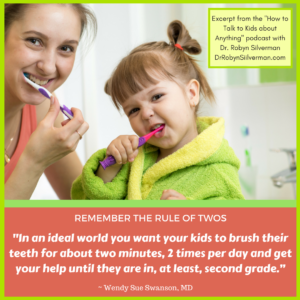 and get your help until they are in, at least, second grade.”
and get your help until they are in, at least, second grade.” - “See your pediatric dental provider at first tooth eruption and every 6 months thereafter.”
- “We need to tell kids; 40% of the gunk in your mouth you get by flossing that you’ll miss with just a standard toothbrush.”
- For 20 minutes after you take a sip of that latte or your children take a sip of that juice or milk, you have acidic changes in your mouth that activate the bacteria that eat at your enamel. If you are sipping all morning long, you have bacteria eating at your enamel all morning long.”
- “If you are at the park and there’s no more soap in the dispenser, don’t forgo the hand washing. It’s actually the act of friction under the water that makes the difference even more than the soap itself.”
- “Lice is not a hygiene thing. It’s not a health hazard. It’s just a yucky inconvenience.”
- “After 24 hours of the lice not sitting on the scalp, it’s a goner. So you don’t need to go completely banana brains.”
Resources:
- http://seattlemamadoc.seattlechildrens.org/
- Book: Mama Doc Medicine https://www.amazon.com/Mama-Doc-Medicine-Confidence-Parenting/dp/1581108370/
- Twitter: @SeattleMamaDoc

